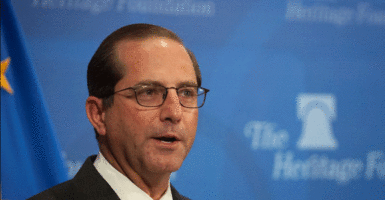Health and Human Services Secretary Alex Azar said Thursday that the Trump administration is working to deregulate health care with the goals of reforming the individual insurance market, lowering prescription drug prices, and creating a “value-based” health care system.
“Today, fixing American health care requires disrupting government-dictated systems, building new ones that encourage choice and competition, and … letting private innovators chart the future and refusing easy gimmicks takes some courage,” Azar said in a speech at The Heritage Foundation’s headquarters on Capitol Hill.
Obamacare significantly harmed the individual insurance market, Azar said, noting that “the year before the most significant new regulations enacted in Obamacare took full effect, through 2017,” individual premiums in 39 states had more than doubled, rising an average of 105 percent.
“Soon after I arrived at HHS, we issued a proposed rule to expand access to short-term insurance policies that are free of the strictures of the Affordable Care Act and, as a result, cost as little as one-third the price,” Azar said. “The previous administration limited access to these plans in the hope that they could drive people back into the ACA market—remember, if it’s still moving, regulate it.”
The Senate confirmed Azar on Jan. 24 to replace Tom Price, who resigned last fall, as head of the Department of Health and Human Services.
“We care deeply about consumers having the information they need. So we’ve made it clear that these short-term plans aren’t for everyone, but Americans deserve all the affordable alternatives possible,” Azar said.
Azar said Health and Human Services is working to address the Obama administration’s expansion of Medicaid. This expansion was a departure from Medicaid’s standard coverage for low-income Americans, including mothers, children, the elderly, and the disabled, he said, and added about 15 million able-bodied Americans to the program, many of whom don’t have children.
“Supporting legislation to undo those perverse incentives is a priority for this administration,” Azar said. “But in the meantime, we want to rethink how Medicaid serves able-bodied, working-age adults, which is why we have encouraged states to consider work and community engagement requirements for these populations.”
The 24th secretary of Health and Human Services said the Trump administration also is dedicated to reducing drug prices.
“The three other elements of our plan are … giving private negotiators more power within our system to negotiate with drug companies, empowering consumers to bring down out-of-pocket costs, and stoking competition in drug markets,” Azar said.
Azar said it’s important to place a high priority on the value of health care rather than the volume.
“Value-based payment, for instance, means paying providers based on the outcomes of their services, not the volume,” he said. “That is why HHS is beginning a comprehensive review of regulations that impede the ability of doctors, hospitals, and payers to coordinate in delivering better care at a lower cost.”
The day before Azar’s speech at Heritage, the House passed two bills, one to expand health savings accounts and the other to postpone Obamacare’s health insurance tax.
In a question-and-answer session following his remarks, Azar said health savings accounts are meant to be a significant asset to consumers.
“It’s no secret we are incredibly supportive of health savings accounts as a tool for providing access to patients,” Azar said. “The point wasn’t simply high-deductible plans to shove burden on the patient, the point was high-deductible plans that then have that deductible aid that would be filled by tax-free savings or employer-funded savings that could be used against that.”
Wesley Coopersmith, policy director of Heritage Action for America, the lobbying arm of The Heritage Foundation, praised the House action in an email to The Daily Signal.
Final passage of the bill to expand health savings accounts “will benefit millions of Americans using these accounts,” Coopersmith said.
“It also clearly demonstrates to the American people that Republicans want patient control over their own health care decisions while Democrats want government control,” he said. “We look forward to working with Congress to continue expanding health care choice and lowering costs, and ultimately repealing and replacing Obamacare.”
In 2003, President George W. Bush signed into law legislation creating tax-free health saving accounts. The idea was to allow consumers to save for future health care expenses, and more than 20 million individuals nationwide now use them, according to Heritage Action.































